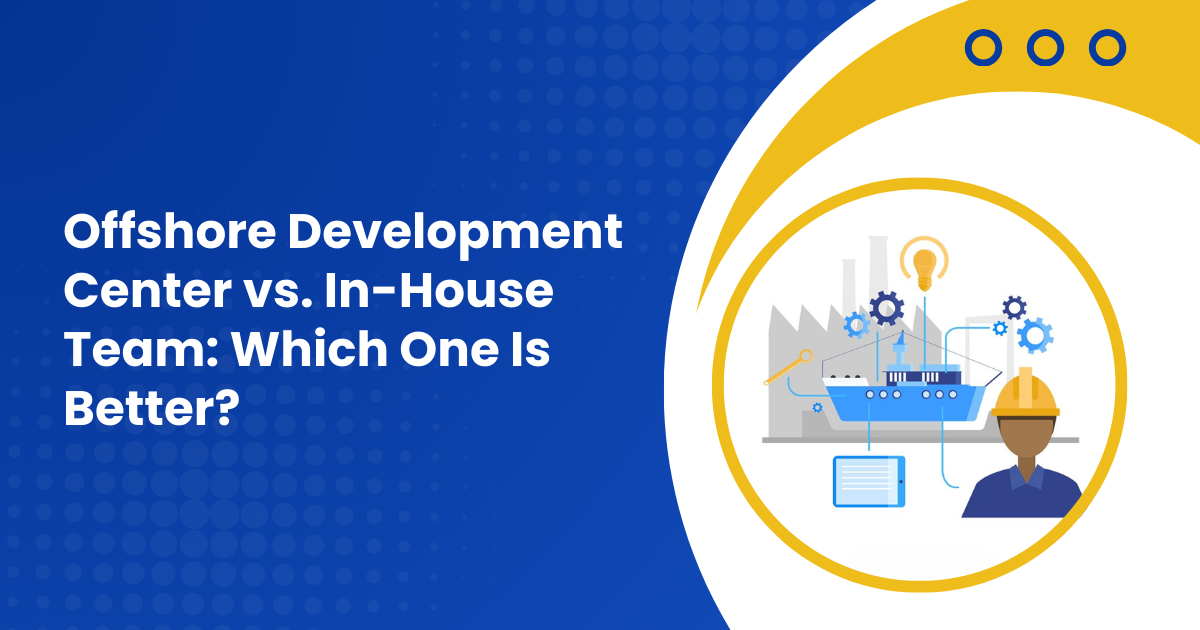Offshore Development Center vs. In-House Team: Which One Is Better?

Strong 8k brings an ultra-HD IPTV experience to your living room and your pocket.
In today's fast-paced technological landscape, companies are continually looking for ways to stay competitive and efficiently develop software solutions. Two common approaches for building development teams are offshore development centers (ODCs) and in-house teams. Each has its advantages and challenges, depending on the needs of the organization. Deciding which approach is better can significantly impact a company's cost, flexibility, and speed in delivering products.
What is an Offshore Development Center (ODC)?
An Offshore Development Center (ODC) is a dedicated team of developers, testers, and other software professionals located in a foreign country. ODCs are usually set up in regions with lower labor costs, providing businesses with a cost-effective way to access a broad pool of talent. Offshore development centers operate as an extension of a company’s in-house development team, and they often focus on specific projects or long-term software development goals.
ODCs are typically structured as follows:
- Long-term partnerships with businesses in other countries.
- A dedicated team that works exclusively on the client’s projects.
- Infrastructure and operations handled by the offshore provider.
What Are Offshore Development Services?
Offshore Development Services refer to the specialized services offered by offshore teams. These include software development, quality assurance, project management, and other technical support, depending on the project’s scope. Offshore services are widely used by organizations seeking a more cost-effective and scalable approach to development.
What is an In-House Development Team?
An In-House Team refers to the internal staff of developers, project managers, and other IT professionals who work directly within the organization’s premises. In-house teams are hired by the business and are dedicated to working on the company's software development needs. This team is usually based in the company's home country, with a higher degree of collaboration and integration with other internal departments.
In-house teams are often preferred by companies that prioritize control, communication, and alignment with their business goals. These teams can work closely with leadership, marketing, and other departments to ensure that the software aligns with the company’s strategic objectives.
Key Factors to Consider: Offshore Development Center vs. In-House Team
1. Cost Efficiency
Cost is often one of the most important factors when deciding between an offshore development center and an in-house team.
Offshore Development Center:
Lower Operational Costs: One of the main reasons companies opt for ODCs is the significant cost savings. Offshore teams are typically based in countries with lower labor costs. For instance, the average software development cost in India, the Philippines, or Eastern Europe is much lower than in the US or Western Europe.
Scalability: Offshore development centers allow for more flexibility in scaling up or down, depending on the needs of the project, without the complexities of hiring and firing in-house employees.
Example: A company based in the US might save as much as 50-70% on development costs by outsourcing work to an ODC in India or Ukraine, especially when dealing with long-term projects.
In-House Team:
Higher Labor Costs: The main disadvantage of in-house teams is the higher cost of hiring local talent. Salaries, benefits, office space, and other overheads add up quickly, particularly in regions with a high cost of living.
Long-Term Investment: Although in-house teams have higher upfront costs, businesses benefit from the continuity and control over the team. However, scaling can be expensive and time-consuming.
2. Communication and Collaboration
Effective communication is critical for the success of any development project. The proximity of team members can significantly affect the ease and quality of communication.
Offshore Development Center:
Time Zone Differences: One of the most significant challenges with offshore development centers is the time zone differences. Working across different time zones can lead to delays in communication, impacting project timelines and reducing real-time collaboration.
Cultural and Language Barriers: Offshore teams may also face cultural differences or language barriers that can hinder smooth communication. However, these challenges can be mitigated by choosing an offshore team that has experience working with clients in your region and by maintaining clear communication protocols.
Example: A company working with an offshore team in the Philippines might find that the 12-hour time difference between the US and the Philippines slows down response times, requiring adjustments in project management.
In-House Team:
Proximity and Easy Communication: In-house teams benefit from direct communication and close collaboration. They can meet face-to-face for quick updates, brainstorming sessions, or urgent problem-solving.
Better Team Integration: In-house teams are often more integrated into the company culture, making it easier to align with the company's vision and goals. They also have better access to company leadership for feedback.
3. Quality of Work
Quality assurance is essential to any software development project, and the quality of work produced by the development team plays a vital role in the final product.
Offshore Development Center:
Varying Skill Levels: The quality of work from an ODC can vary depending on the location, the team's skill set, and the quality assurance processes in place. It is essential to carefully vet offshore development companies to ensure they provide the required expertise and high-quality results.
Strict Quality Control: Leading ODCs implement strict quality control measures and follow best practices to ensure that they meet international quality standards. However, businesses must maintain active oversight and set clear expectations.
In-House Team:
Familiarity with Business Requirements: In-house teams are often more familiar with the company's specific needs and goals. This familiarity can lead to higher-quality work that aligns closely with the company’s vision.
Closer Oversight: Since in-house teams are part of the organization, their work is subject to more immediate oversight and review, which can help maintain quality standards.
4. Flexibility and Scalability
The ability to scale a development team up or down based on changing project needs is a critical factor for many businesses.
Offshore Development Center:
Scalability: Offshore development centers are highly scalable, allowing companies to quickly increase the team size for large projects or decrease it when needed. This flexibility is often more cost-effective than hiring full-time in-house employees.
Access to Global Talent: ODCs provide access to a vast pool of talent with expertise in various technologies. Companies can choose teams with specialized skills without geographical constraints.
In-House Team:
Limited Scalability: Scaling an in-house team requires recruitment and onboarding processes, which can take time and come with significant costs. Companies may also face challenges in finding local talent with the right skill set.
Fixed Team Structure: In-house teams have a more fixed structure, and scaling up or down quickly may be more difficult.
5. Control and Security
Control over the development process and data security is another critical aspect of the decision-making process.
Offshore Development Center:
Less Control: With an ODC, you have less direct control over the daily operations of the team. Regular communication and transparent management processes are essential to maintain a smooth working relationship.
Security Concerns: When outsourcing development to an offshore center, data security can be a concern. Companies must ensure that their offshore partner follows stringent data protection and confidentiality practices to avoid security breaches.
In-House Team:
Full Control: An in-house team offers direct control over the development process, making it easier to align the team's output with your goals and address issues promptly.
Better Security: In-house teams are often subject to more stringent security protocols, and companies have greater control over sensitive data and intellectual property.
Conclusion
In the end, the decision between an Offshore Development Center and an in-house team depends on the specific needs of your business. Many companies today opt for a hybrid model, combining the strengths of both offshore and in-house teams to achieve a balance of cost, expertise, and control. By evaluating the unique requirements of your project, you can choose the model that delivers the best results for your business.
Note: IndiBlogHub features both user-submitted and editorial content. We do not verify third-party contributions. Read our Disclaimer and Privacy Policyfor details.







